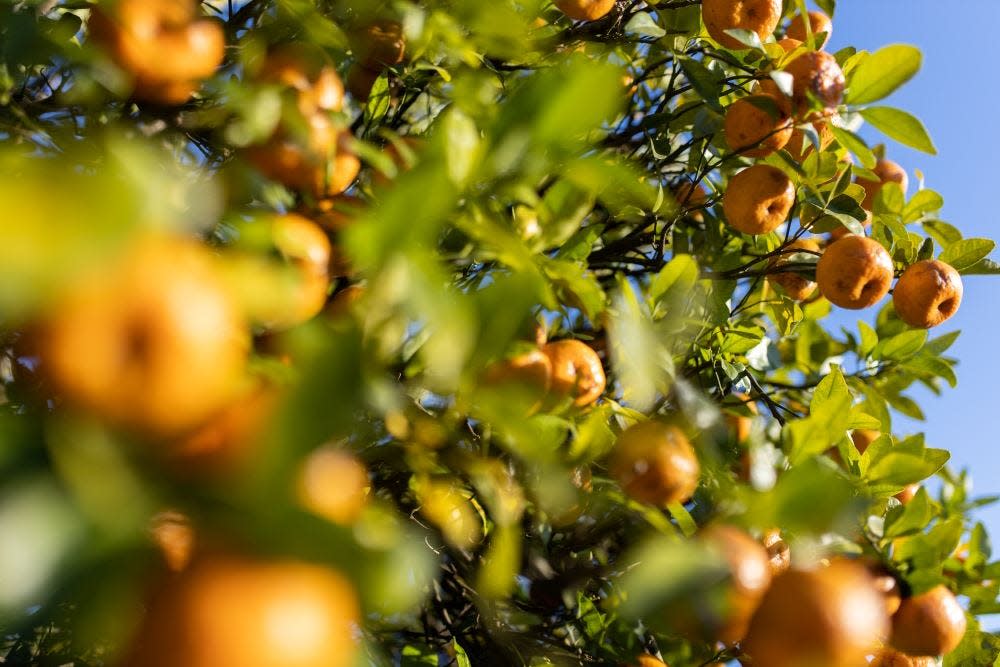No way, EPA: Federal court rules broad-spectrum antibiotic doesn't belong on citrus

It's good for sick people and sick cattle, but not sick orange trees, a federal appeals court ruled, overturning the EPA's approval of the drug streptomycin's use on citrus.
On Wednesday, the San Francisco-based Ninth Circuit Court of Appeals reversed the U.S. Environmental Protection Agency’s previous approval of the antibiotic streptomycin for use as a pesticide on citrus crops. Here are four things to know:
It was a decision spurred by desperation
With farmers on an increasingly frantic search for new weapons against deadly citrus greening, in 2021, the EPA granted emergency permission to use several antibiotics in hopes of fighting the insect-carried disease.
The bacterial infection is carried by a tiny Asian psyllid insect, and has decimated citrus yields in Florida since it first appeared in the early 2000s. It's begun spreading in California groves as well. The state’s citrus industry taken more than an estimated $2 billion hit in economic impact, according to the University of Florida.
At the time, the EPA said the antibiotics oxytetracycline and streptomycin could help counter the effects of Huanglongbing, also known as citrus greening, which the agency called the “most serious citrus disease worldwide."
Many fear the creation of 'superbugs'
Streptomycin is an important drug to counter tuberculosis, especially the multi-drug resistant sort. It also treats staph and urinary tract infections – even bubonic plague.
But over-use of broad-spectrum antibiotics can lead microbes to develop resistance to the very medicines intended to treat them, creating what are called superbugs, something the U.S. Centers for Disease Control and Prevention pointed out after the initial ruling.
The agency warned that widespread antibiotic use could worsen that already grave problem of antibiotic-resistant bacteria, which infect at least 2.8 million people and claim almost 36,000 lives annually, Michael Craig, senior adviser for antibiotic resistance, told The News-Press at the time.
Greening and heartbreak: Proud history up in smoke as Southwest Florida citrus growers cut their losses
Human and animal health advocates raised the alarm
A legal challenge by a coalition of farmworker and environmental groups led to Wednesday's decision. In a release, the nonprofit Earthjustice said it "protects pollinators, imperiled species, and the health of farmworkers who would otherwise face heightened risk of antibiotic-resistant infections." The widespread use of streptomycin in agriculture could also cause long-term harm to animal and plant biodiversity, according to the release. "The decision highlights the EPA’s widespread failure to carry out its duties to protect federally protected endangered species."
Petitioners in the case include the Natural Resources Defense Council and U.S. PIRG (Public Interest), represented by the Natural Resources Defense Council; Beyond Pesticides, Environmental Confederation of Southwest Florida, Farmworker Association of Florida, Farmworker Justice, and Migrant Clinicians Network, represented by Earthjustice; and the Center for Biological Diversity, represented by in-house counsel.
Decision greeted with a shrug by Southwest Florida growers
Controversial as it may have been, streptomycin on area citrus was never widely used. Though some growers like John Paul of Hendry County tried the stuff years ago, the expense and difficulty of application (trees had to be injected individually) made it not worth the time or money. Others, like Joe English never messed with it in the first place. "No, we never used it," the multi-generation Alva grower said. It's pretty much a moot point now anyway, he says. Thanks to greening, his family's once-vast holdings have dwindled. "All we've got left is 12 acres in Collier County," he said.
This article originally appeared on Fort Myers News-Press: EPA rebuffed: Antibiotic shouldn't be used on citrus says appeals court

